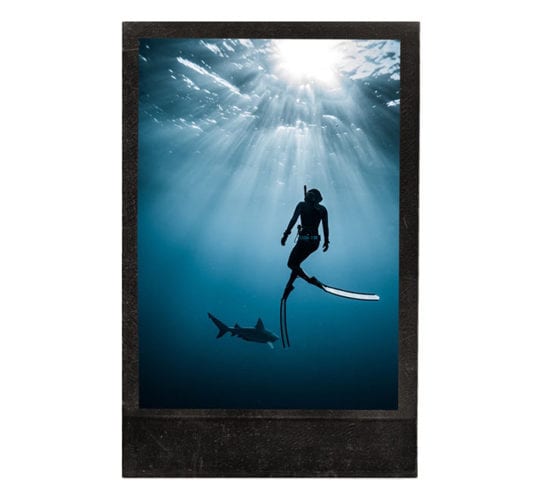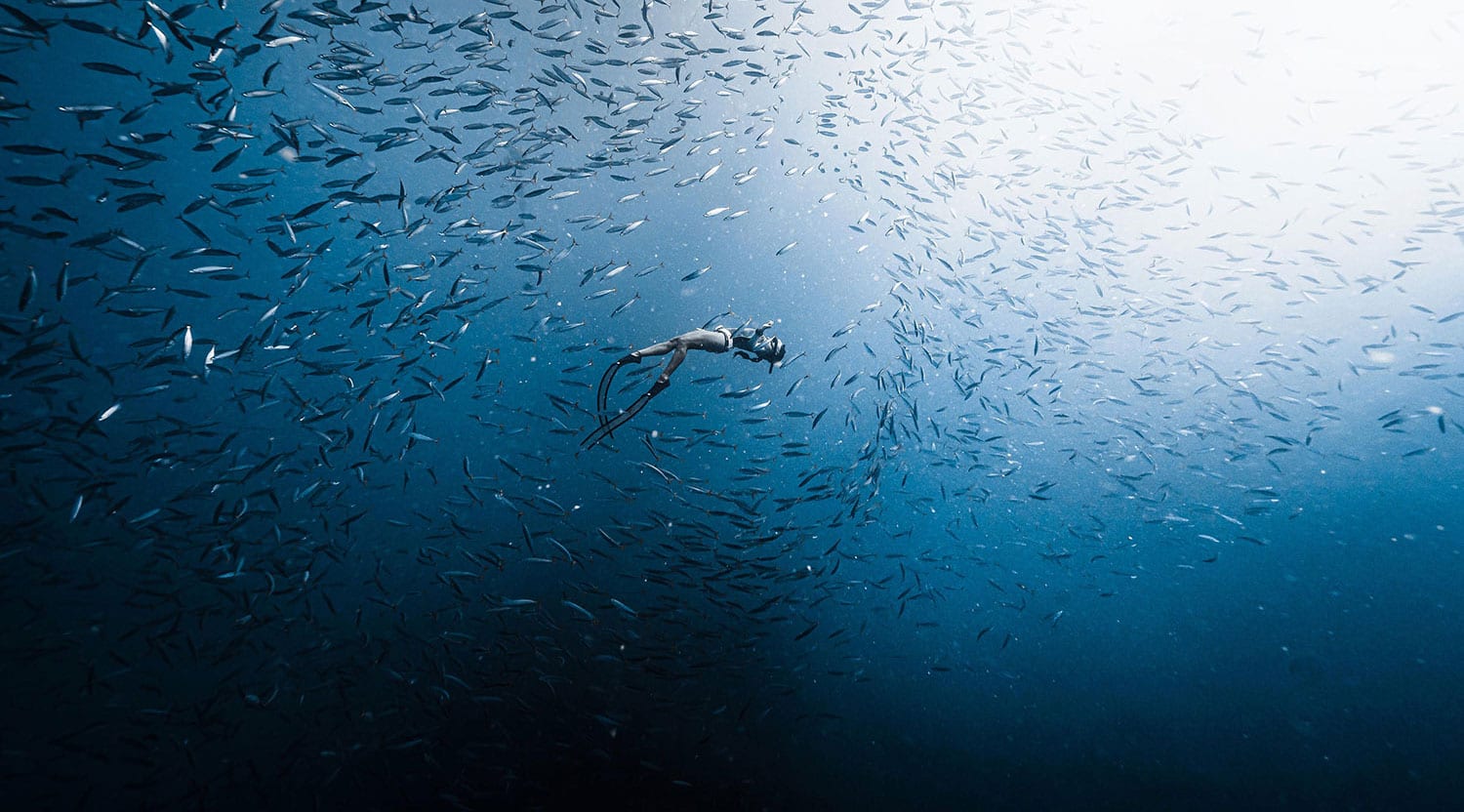Jenna Tanner goes to wonderous depths that many can only dream of witnessing. Calling Hawaii home, she spends her days exploring the suspended aquatic while swimming with sharks, through coral caves, and around lost shipwrecks. Freediving for her isn’t just a sport or hobby, it’s a way of life, allowing her to live in another dimension of peace and curiosity. We caught up with Jenna Tanner to discuss deep dives, mental tactics, gear, and tips on doing our part to support initiatives to clean up the oceans from pesky plastic overload. In a year where we all feel a little too cooped up, Jenna’s wide-open sunkissed mindset serves as a wave of incentive to get out and turn what you love into a full-time career.
***
CYTIES: Let’s dive in (no pun intended). Swimming into the dark blue seems a little intimidating to anyone not used to the ocean, tell us how fear plays a role in your diving, and how you overcome it?
JENNA: For me freediving has turned into an incredible vehicle for conquering fears. The first time I ducked underwater to dive into a dark cave, I was scared but determined to do it. Now, diving caves and swim-throughs are one of my favorite activities. There are lots of opportunities to conquer your fears when you get in the ocean. There’s beautiful deep blue pelagic diving that makes you feel like you’re lost in outer space. There’s also wildlife that might scare the average person. Recently, I traveled to Florida and had the opportunity to dive with bull sharks. That was scary at first, but I made sure to go with a well-trained guide. Once I got in and felt the energy of that environment and realized that I didn’t feel threatened by the sharks, the fear disappeared. Obviously, we always have to stay alert when in the water with sharks, but there’s no reason to be scared. 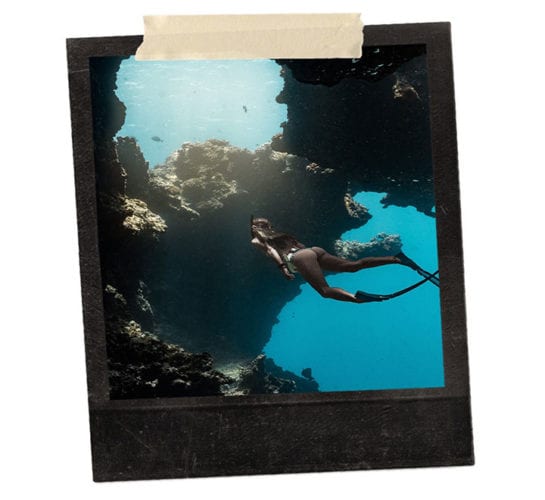 CYTIES: When was the moment you knew Freediving was your new life endeavor?
CYTIES: When was the moment you knew Freediving was your new life endeavor?
JENNA: Oh, that’s tough… I don’t know that I can pinpoint a specific moment, more like a series of moments. When I first started working at a corporate-type job in my early 20s, I was really bummed out. I felt like society had set things up all wrong: go to school so you can get a good job, get a good job and work hard so you can retire and then once you’re 65 or even older, then you’re free to actually do the things that you love and you’re passionate about. That never sat right with me. I hadn’t really known there was another option. Don’t get me wrong, I didn’t hate my job, but it didn’t light me up inside like freediving does. A little over a year ago I said ‘fuck it’ and stopped waiting for my life to start. Now I’m a freedive instructor, and I do some consulting on the side. I’ve never been happier.
CYTIES: Getting to that “fuck it” moment isn’t easy, what’s the best advice you can give to someone searching to turn an adventurous passion into a career?
JENNA: My best advice is to stop worrying about what other people are going to think. That was the number one thing holding me back for so long. I was worried about what my parents would say and what my friends and coworkers would think. You’re the one that has to live your life, don’t let what someone else might think stop you from doing what’s best for you. 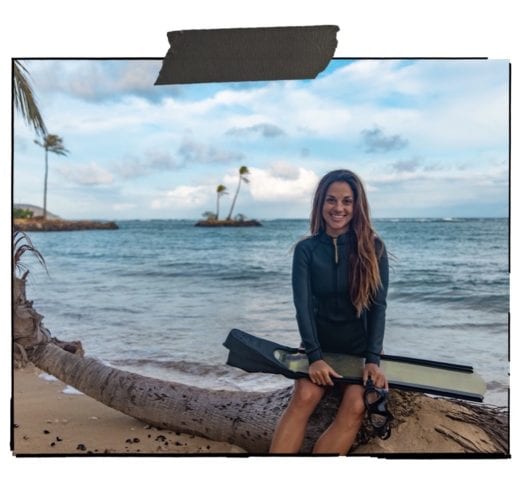 CYTIES: What’s the most stunning view you’ve seen in the ocean?
CYTIES: What’s the most stunning view you’ve seen in the ocean?
JENNA: The most stunning view I’ve seen would have to be humpback whales swimming with pilot whales in Tahiti. The pictures don’t do it justice. There was even an Oceanic Whitetip shark trailing the whales. Just so much wildlife interacting, and we were lucky enough to see it all.
CYTIES: Wow, like a conga line of epic sea creatures. So, how long can you hold your breath? What’s that training like professionally?
JENNA: If I’m going to be obnoxious I’ll say longer than I’ve ever held it, because I’ve never blacked out from a static breath hold. That’s what freedivers call holding your breath while relaxing at the surface. The longest I’ve held my breath is four and a half minutes, but I know I can go longer. Training for static breath holds is my least favorite part of diving, and I know I’m not alone. It takes so much mental toughness to sit through minutes of being very, very uncomfortable when all you have to do to make it stop is lift your head up and breathe. While I know it’ll improve my diving, it’s hard for me to focus on it when I’d just rather be in the ocean. It’s on my list for things I need to improve on. 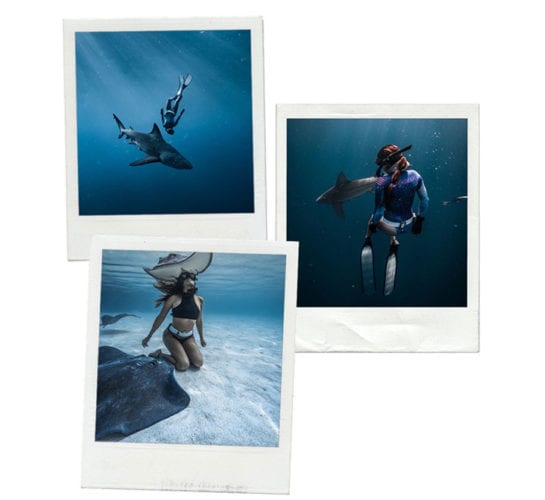 CYTIES: You also do your part with plastics in the ocean, can you tell us a little more about this effort?
CYTIES: You also do your part with plastics in the ocean, can you tell us a little more about this effort?
JENNA: Plastics have made their way into everything it seems. Scientists have found microplastics in the air in the Alps, and they’ve found plastics in the bottom of the deepest ocean trench on Earth. Some people may wonder why that’s a problem. Marine animals get tangled up in plastic pollution as well as they mistake it for food and often die. Whales are constantly washing up dead onshore with bellies full of plastic bags and other trash. Plastic is damaging to our health as humans as well. We don’t fully understand what the long term effects of ingesting microplastics and eating animals that themselves have eaten plastics is on us. Many of these plastics have tested positive for carcinogens like BPA. Personally, I don’t want that in my body. Plastic even adds to our climate change problem by releasing greenhouse gases when it degrades.
A really great documentary I just watched and recommend to anyone wanting to learn more about our plastic problem is “The Story of Plastic.”
CYTIES: What are some easy changes our readers at home can do to help minimize plastic waste?
JENNA: Stop buying plastic water bottles and bring a reusable water bottle with you when you leave the house. I take mine everywhere and it’s insulated so the water stays super cold. When getting takeout, ask the restaurant if they can package the food in plastic-free containers. Even if they don’t offer it, the more customers ask for it the more they’ll consider making the switch. Be conscious about what you’re buying at the grocery store. Can you find it without plastic packaging? Just being aware of how much plastic you’re buying can help you to start making small changes. We don’t need you to be perfectly plastic-free, we need everyone to try their best.
A little over a year ago I said ‘fuck it’ and stopped waiting for my life to start.
CYTIES: Take us through your EDC, gear, gadgets, and/or brands you love when headed out to the ocean?
JENNA: I already mentioned bringing my Hydroflask with me everywhere. It keeps my water cold and refreshing when I’m spending hours in the hot sun. Sunscreen is a must, but it has got to be reef-safe. Check your sunscreen ingredients, the only active ingredients should be non-nano zinc oxide or titanium dioxide. If there’s any other active ingredient listed, it isn’t safe for it to enter our waters. Raw Elements and Avasol are both great reef-safe sunscreen brands that come in cardboard or tin containers. My favorite wetsuit brand is Waihana Wetsuits. They have different styles and thicknesses, so I’m perfectly warm in every climate I’m diving in.
CYTIES: If you’re not in the sea, what is Jenna Tanner up to in Hawaii?
JENNA: If I’m not in the water, you can find me on a sailboat. I’ve been fascinated with the idea of sailing for years and finally, about a year ago, I started hopping on friends’ boats whenever I could to learn. I’m still very new to it, but I love it. When the weather is bad for diving and sailing, you’ll find me reading a book in bed with my two cats. I also love to cook! I eat mostly plant-based and love creating delicious meals for my friends.
CYTIES: If there was one invention not yet created that would enhance freediving, what would it be?
JENNA: Another tough question! All of the inventions I am thinking of would make diving easier, something that inflates underwater to bring you to the surface for example. However, those types of things already exist but they’re largely not used by divers. A big part of diving for me is pushing my limits, seeing what my body is capable of. I never thought I’d be diving over 100′ and now I’m aiming at hitting 200′ soon. It really is incredible what we’re capable of. Using some outside aid to achieve those depths wouldn’t be the same.
CYTIES: What’s next with your Freediving career?
JENNA: I plan to keep teaching and hopefully I’ll be able to start traveling and teaching soon. The idea of traveling around the world while teaching a sport that I love is a dream for me. Maybe on a sailboat… yes, that’s what I want.
CYTIES: Let us know when so we can hop on board. Last question, Life Aquatic or Point Break?
JENNA: Life Aquatic. I love Bill Murray.
***
We love Bill Murray too… thanks for chatting with us Jenna, no doubt your words will inspire some new adventures to our readers. May all the breezes be warm, and here’s to safe journeys through and into the deep blue.
